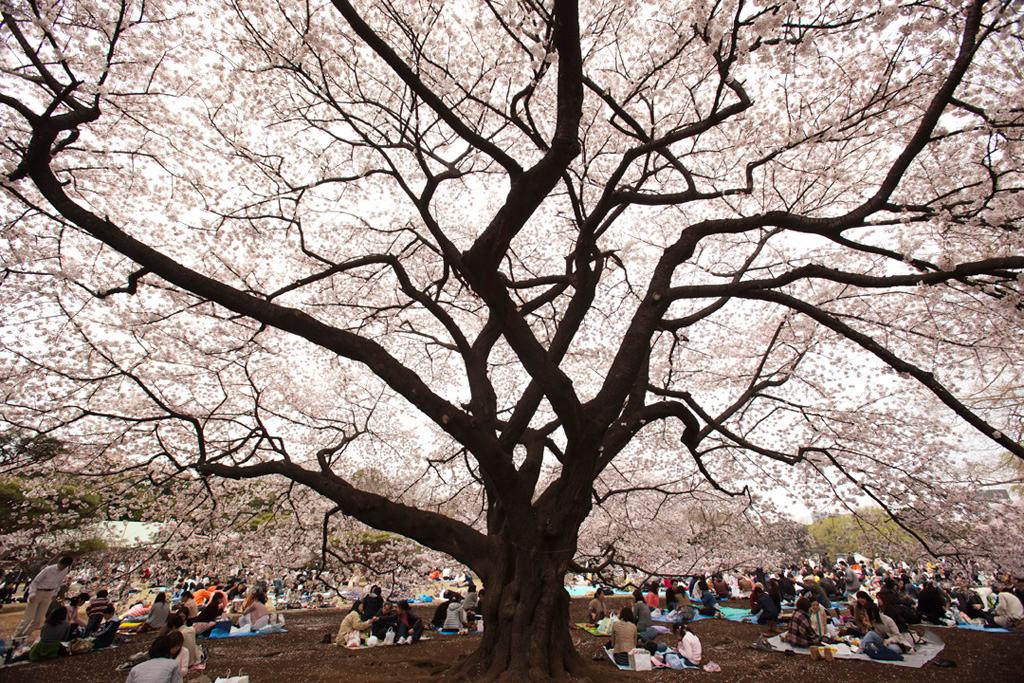Japan: New prime minister, same problems
Visitors gather under cherry blossoms trees at Shinjuku Gyoen National Garden on April 10, 2011 in Tokyo, Japan.
TOYKO, Japan — Choosing a new prime minister has become as much an annual rite of Japanese life as sipping sake beneath the cherry blossoms. While the latter is invariably a pleasant experience, the former is an increasingly unedifying affair.
Yoshihiko Noda's expected appointment on Tuesday as Japan's seventh prime minister in six years follows his victory Monday in the latest race for the leadership of the governing Democratic party of Japan (DPJ).
Noda, the current finance minister, beat his nearest rival, the trade minister Banri Kaieda, in a run-off after none of the initial five contenders were able to secure enough votes in the first round.
More from GlobalPost: Can the Japanese economy recover after three disasters?
The contest led many to ask why the party chose to settle simmering factional power struggle at a time when Japan should be focused on its recovery from March's triple disaster and the parlous state of its economy.
If Noda is to avoid eliciting yet more public scorn for Japan's political class, his first task after being formally elected prime minister by MPs in the DPJ-controlled lower house of parliament will be to unite his party, even if only temporarily, and concentrate on running a country in dire need of leadership.
"Let us sweat together for the sake of the people," he said after today's vote. "This is my heartfelt wish."
Noda, a fiscal conservative whose victory was largely welcomed by investors, has prioritized tackling Japan's debt, the highest in the industrialized world at around twice the size of its $5 trillion economy.
He must also confront other short-term economic headaches: the March 11 disaster tipped Japan back into recession, and the yen's phenomenal surge — it recently reached a postwar high against the dollar — is hurting the country's exporters.
More from GlobalPost: Moody's downgrades Japan's debt
In June his predecessor, Naoto Kan, promised to resign once he had overseen the passage of legislation to make cash available for the reconstruction effort on the northeast coast and to promote renewable energy in the wake of the nuclear crisis at the Fukushima Daiichi power plant.
Paying for reconstruction — which cost about 19 trillion yen over the next five years — and reducing the national debt has raised the specter of tax increases.
Noda on Monday indicated he would consider raising taxes given that the only alternative appears to be yet more borrowing.
He no doubt had in mind the decision last week by Moody's Investor Service to cut Japan's credit rating, citing the country's debt and the lack of political stability.
"Let's do the utmost to tackle what we have promised and if there's not enough money, we might ask the people to share the burden," he said of the possibility of doubling the 5 percent sales tax to cut the national debt and pay for welfare. A temporary tax rise may also be in the pipeline to fund reconstruction, although Noda has been vague about the timing.
Then there is the tricky question of energy policy. Perhaps Kan's biggest achievement was winning public support for a phasing out of Japan's nuclear power plants — a significant sea-change given that, until March 11, Japan depended on nuclear for more than a third of its energy needs.
Noda has indicated he shares that vision of a nuclear-free future, but has warned that the reactors that are currently offline must undergo prompt security checks and be restarted if Japan is to avoid a power crunch over the coming year.
But given the ephemeral nature of power in Japan's highest office, can Noda remain in place enough to make a difference? His five predecessors each lasted about a year, and his approval ratings among the public in the run-up to today's election were pitifully low.
More from GlobalPost: Japan's nuclear gypsies, a day in the life
His longevity will depend to a large degree on whether he can reach an agreement with the DPJ's opponents to end the policy gridlock in Japan's upper house, where his party does not have an overall majority.
Speculation is mounting that he will resurrect Kan's short-lived plan to form a grand coalition with opposition parties in the hope of regaining legislative momentum.
In an editorial, the Tokyo Shimbun echoed a commonly held view that long-term stability was too ambitious: "Although the Kan administration, which was enveloped by deadlock, has finally decided to step down and a new government will begin, frankly, our hopes are not growing."
With so many domestic challenges demanding his immediate attention, foreign policy barely registered during the leadership race, but it may yet cause Noda problems.
He is unwavering in his support for close military ties to the United States and, while complimentary about China's economic development, has warned that Beijing's military spending represents a threat to regional security.
He has courted controversy for his views on Japan's wartime record, recently repeating a controversial view that former leaders convicted by the international military tribunal should no longer be described as war criminals.
He is not, however, expected to risk inflicting instant damage to ties with China and South Korea by visiting Yasukuni, a shrine in Tokyo that honors Japan's war dead, including class-A war criminals.
"To improve the relationship between the world's second and third biggest economies, Noda's cabinet has to carefully craft and implement a proper policy in treating Japan's war past to soothe the resentment among the Chinese public toward Japan," Xinhua, China's state news agency, said.
Every day, reporters and producers at The World are hard at work bringing you human-centered news from across the globe. But we can’t do it without you. We need your support to ensure we can continue this work for another year.
Make a gift today, and you’ll help us unlock a matching gift of $67,000!
